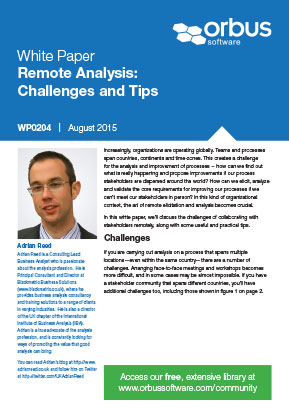It is more and more frequent for business analysts, process analysts and other change practitioners to need to work and collaborate remotely with stakeholders. Virtual collaboration creates a different set of challenges when compared with working face-to-face, but careful preparation can ensure that we elicit and analyze processes and requirements effectively. Utilization of technology such as video and web-conferencing can help. Additionally, it is important that we are mindful of cultural, language and time-zone differences. Adrian’s paper addresses such challenges and provides practical techniques to ensure the best possible stakeholder collaborations, including Document Analysis, Interviews, Virtual Workshops and more.
Increasingly, organizations are operating globally. Teams and processes span countries, continents and time-zones. This creates a challenge for the analysis and improvement of processes -- how can we find out what is really happening and propose improvements if our process stakeholders are dispersed around the world? How can we elicit, analyze and validate the core requirements for improving our processes if we can’t meet our stakeholders in person? In this kind of organizational context, the art of remote elicitation and analysis becomes crucial.
In this eBook, we’ll discuss the challenges of collaborating with stakeholders remotely, along with some useful and practical tips.
Challenges
If you are carrying out analysis on a process that spans multiple locations—even within the same country—there are a number of challenges. Arranging face-to-face meetings and workshops becomes more difficult, and in some cases may be almost impossible. If you have a stakeholder community that spans different countries, you’ll have additional challenges too, including those shown in figure 1 on page 2.
Login to continue reading or register now to download the ebook.
